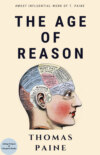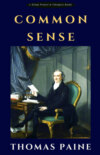Umfang 2550 Seiten
THOMAS PAINE Ultimate Collection: Political Works, Philosophical Writings, Speeches, Letters & Biography (Including Common Sense, The Rights of Man & The Age of Reason)
Über das Buch
In the expansive anthology, «THOMAS PAINE Ultimate Collection,» readers are offered a meticulously curated compendium of Paine's seminal political works, philosophical writings, speeches, letters, and biography. Spanning the tumultuous backdrop of the late 18th century, this collection includes iconic texts such as «Common Sense,» which galvanized American independence, «The Rights of Man,» advocating for civil liberties and self-governance, and «The Age of Reason,» a critique of institutionalized religion. Paine's accessible prose and impassioned rhetoric reflect the Enlightenment's fervor for reason and progress, positioning him as a radical thinker whose ideas challenged the status quo and inspired revolutionary movements globally. Thomas Paine'Äôs life was marked by a relentless pursuit of social justice and equality, reflecting the principles he fervently espoused in his writings. Born in England, Paine emigrated to America in the early 1770s, where he became a pivotal figure in the fight against tyranny while advocating for the rights of the common man. His experiences as an artisan and his deep dissatisfaction with monarchical power fueled his compelling arguments, enabling him to articulate the aspirations of a burgeoning nation. This collection is essential for anyone seeking to comprehend the roots of modern democracy and human rights. Paine's works remain remarkably relevant, encouraging critical engagement with governance, social justice, and reason. This anthology is not only a historical document but also a clarion call for readers to reflect on the enduring principles of liberty and equality.




















